The last post I did touched on the issue of non-hetero couples having the right to have children.
Nathan suggested that having children has become a right.
Then he asked if parents have the right to raise children as they want.
Addressing the third issue first, current international law and domestic legislation favours the wellbeing of the child over the rights of the parents.
Section 61DA of the Family Law Act (Cth) requires the Court to apply a rebuttable presumption that it is in the best interests of the child for the child’s parents to have equal shared parental responsibility for the child (also see s 65DAA). Section 60CA cements the position that the Child’s best interests are paramount when making a parenting order. A child also gets their own representation separate from all other party’s whose primary task is to ensure the child’s best interested are represented.
In my opinion the current ideals are a little weak in recognising a parent’s right to raise their own child. for example, if a child is removed from their parents custody at a young age, say they are given to their father’s parents, and a few years later a mother, now single with the father gone, wants to retrieve custody of the child from the grandparents, the grandparents will have a very strong case to retain custody, on the grounds it is in the best interests of the child (s 65C Family Law Act). This concerns me as I think it may not necessarily lead to a presumption that the best interests of the child would be a longer-term plan focused on returning the child to the parent’s custody, despite the parent’s efforts.
However, back to Nathan’s issues, the legislation doesn’t recognise a parent’s right to do whatever they want with their child. I think to a certain degree the State should put limitations on parenting. Like with most topics, I think a certain level of regulation of parenting is beneficial. I think in this sense, acting in the best interests of the child is the correct approach. However, it should take into consideration where possible the wants of the parents.
So, now onto the bit I think Nathan really wants me to address, evil homosexuals deserve the right to have children?
My basic though process, which I admit I think needs further refinement, is that the State (and international bodies such as the UN, see the Wiki article on rights of a child, has defined the requirements of parentage, and can further add and vary these requirements. There is nothing in my mind that suggests that homosexual parents would not be in the best interests of the child. Aside from issues that derive from social stigmas, a child with same-sex parents should have as quality an upbringing as any other. So really, the only reason a child with same-sex parents should be at a disadvantage is because of the segment of society who doesn’t believe in this lifestyle and chooses to create difficulties.
Same-sex parents aren’t the enemy to children, or adults. The bad things in this world are violent people, inconsiderate people, people that willingly cause harm or distress to others. Homosexuality does not mean that a person carries these traits. They are not mutually exclusive, but they are also definitely not psychologically attached.
Provided parents provide adequately for their children, that’s where the judgement should end. We should put our efforts into making society more accommodating, rather than reinforcing its limitations.
So I think the problem is not should “non-traditional” couples be allowed to have children, but rather how it should be implemented, as even traditional couples who can’t have children have not found the path to having a family easy. And I guess this leads to Nathan’s last question, is having children a right. I would like to say everyone who deserves children should be able to have them, however I don’t think this is possible, due to if nothing else supply constraints. I think many people think of children as a right to the point that they believe they should be supported in their right to have children, to the point society should subsidise and provide for their right. I do not agree with this. I think, like anything in life, children are something parents should have to work for, and provide for themselves. I do think there are instances where the State can assist, but not to the extent I think many people believe they are entitled to. One area that I think State can assist in is equality in opportunity, and for this reason I find no difficulty supporting consideration of extending the surrogacy laws.



